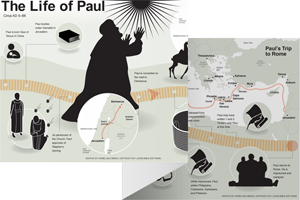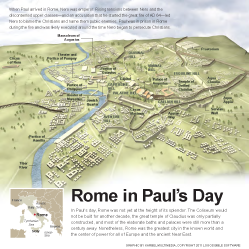1:1–7 Paul wrote Romans toward the end of his third missionary journey (mid-50s ad), probably from Corinth (Acts 19:21; 20:3). Though he does not explicitly mention his purpose for writing this letter, he describes his circumstances: He plans to deliver financial relief to the believers in Jerusalem to promote unity among the Jewish and Gentile churches (Rom 15:25–27). Unity in Christ is a major theme of Romans. |
1:1 Paul Formerly known as Saul of Tarsus (Acts 7:58; 9:11).
Paul’s expertise in Jewish law and thorough understanding of Greek and Roman culture made him ideally suited to proclaim the gospel among the Gentiles (non-Jews). Born a Roman citizen (Acts 22:28), Paul grew up in Tarsus, one of the largest cities in the Roman Empire (located in the southeastern region of modern-day Turkey). In Tarsus, he was exposed to Graeco-Roman customs, religions, and philosophies, and he apparently became fluent in Greek. Paul’s quotations of thinkers like Aratus (Acts 17:28), Menander (1 Cor 15:33), and Epimenides (Titus 1:12) are evidence of his knowledge of Greek philosophy. |
slave of Christ Jesus Paul uses this language metaphorically to indicate that his life and ministry exhibit humility and submissiveness—characteristics associated with slavery and servitude during the first century.
 Pauline Self-Designations Table
Pauline Self-Designations Table
apostle A person designated and sent to speak and act with special authority. Paul regularly introduces himself as an apostle in his letters (e.g., 1 Cor 1:1; Eph 1:1; 1 Tim 1:1). Paul’s use of the title “apostle” highlights that his authority was equal to that of the 12 apostles and that his commission was from Christ (compare 1 Cor 15:7–9; Gal 1:1).
in his letters (e.g., 1 Cor 1:1; Eph 1:1; 1 Tim 1:1). Paul’s use of the title “apostle” highlights that his authority was equal to that of the 12 apostles and that his commission was from Christ (compare 1 Cor 15:7–9; Gal 1:1).
set apart The Greek word used here, aphorizō, describes setting something or someone apart for a particular function or task. God set Paul apart to proclaim the gospel message about Jesus Christ. Like the prophet Jeremiah, Paul considered himself set apart before he was born (compare Gal 1:15; Jer 1:5).
Paul considered himself set apart before he was born (compare Gal 1:15; Jer 1:5).
the gospel of God Refers to the good news of Jesus coming to save humanity.
1:2 prophets Refers to people who are designated by God to speak on His behalf and critique their society—telling about present problems and, at times, future events (see note on Gen 20:7). Here Paul mentions the prophets to emphasize continuity between the promises that God delivered through the prophets in the ot and the fulfillment of those promises in the gospel.
 Jesus’ Fulfillment of Old Testament Prophecy Table
Jesus’ Fulfillment of Old Testament Prophecy Table
holy scriptures Israel’s sacred writings. Paul’s audience likely understood the Septuagint (the Greek translation of the ot) to be on par with the Hebrew version of the Scriptures.
(the Greek translation of the ot) to be on par with the Hebrew version of the Scriptures.
1:3 his Son Shorthand for “Son of God,” a reference to Jesus Christ—the focus of the gospel message. This designation expresses the unique, intimate relationship between Jesus Christ and God. It also might express that Jesus is the Messiah and the appointed King—like David, who also is given this title. In this letter, Paul describes believers as children of God and co-heirs with Christ (Rom 8:16–17).
a reference to Jesus Christ—the focus of the gospel message. This designation expresses the unique, intimate relationship between Jesus Christ and God. It also might express that Jesus is the Messiah and the appointed King—like David, who also is given this title. In this letter, Paul describes believers as children of God and co-heirs with Christ (Rom 8:16–17).
descendant of David This phrase emphasizes Jesus’ humanity and confirms His status as God’s appointed ruler.
1:4 who was declared This is the only time Paul uses the Greek term horizō, meaning “to determine” or “to appoint.” In Acts, it is used to show that God appointed Christ as the judge of the world (Acts 10:42; 17:31). Jesus proved His divine authority and established Himself as the expected Davidic Messiah through His resurrection from the dead.
as the judge of the world (Acts 10:42; 17:31). Jesus proved His divine authority and established Himself as the expected Davidic Messiah through His resurrection from the dead.
Holy Spirit The Holy Spirit demonstrated power through the resurrection of Jesus Christ.
demonstrated power through the resurrection of Jesus Christ.
resurrection Paul describes resurrection as the foundation of Christian hope (compare 1 Cor 15:15–19). Paul’s view is based on connections among ot prophecies about resurrection.
1:5 obedience of faith The Greek phrase used here might refer to obedience that is brought about by faith. Alternatively, it could mean “obedience, which is faith.” The expression also could simply describe the inseparable nature of obedience and faith.
Gentiles Jesus chose Paul for the purpose of telling Gentiles (non-Jewish people) about the gospel (see Acts 9:15 and note). Paul understood that God included the Gentiles in His plan of salvation, and he therefore made the Gentiles the focus of his missionary efforts (see Acts 13:46; 18:6; compare Gal 3:14; Gen 12:3). The apostles in Jerusalem likewise recognized Paul’s appointment by God as the apostle to the Gentiles (see Gal 2:9; Rom 11:13).
(non-Jewish people) about the gospel (see Acts 9:15 and note). Paul understood that God included the Gentiles in His plan of salvation, and he therefore made the Gentiles the focus of his missionary efforts (see Acts 13:46; 18:6; compare Gal 3:14; Gen 12:3). The apostles in Jerusalem likewise recognized Paul’s appointment by God as the apostle to the Gentiles (see Gal 2:9; Rom 11:13).
name The Greek word used here for “name,” onoma, refers to a person’s character and reputation. Paul’s missionary efforts among the Gentiles are for the benefit of Christ’s name, not his own. See note on 2:24.
1:6 the called of Jesus Christ God’s call brings people into relationship with Jesus Christ.
1:7 Rome The capital city of the Roman Empire. Paul wanted to visit Rome on his way to Spain (Acts 19:21; Rom 15:24, 29). He also wanted to impart a “spiritual gift” to the believers in Rome (v. 11 and note).
(v. 11 and note).
saints The Greek term used here, hagioi, refers to those who have been set apart as God’s people.
The Greek word hagioi, translated as “saints” or “holy ones,” refers to those who are set apart or belong to God. In the ot, “saints” refers to Israel, God’s chosen people (see Psa 16:3 and note). Here, Paul applies it to the Gentile believers in Rome, identifying them as among God’s chosen people. In the nt, all occurrences of hagioi, “saints,” appear in plural form. Paul addresses other believers as “saints” throughout his letters (1 Cor 1:2; 2 Cor 1:1; Eph 1:1; Phil 1:2). Their status as “holy ones” results from their union with God, who is holy.
|
Grace to you and peace Paul’s typical greeting throughout his letters (compare Gal 1:3; Eph 1:2; Phil 1:2). It summarizes his gospel message: God’s work through Christ (grace) brings people into a harmonious relationship with God and one another (peace).
God our Father The word “our” indicates that Jews and Gentiles (non-Jewish people) are equal and united before God because of Christ. False teachers may have claimed that the Gentiles were not equal because they did not participate in circumcision (Col 2:11; Rom 3:1; Gal 6:12), Sabbath observance (Col 2:16; Gal 4:10–11; Rom 14:6), or dietary restrictions (Gal 2:12; Rom 14:20)—distinctly Jewish practices. Such teachings would have brought division to the Church.
(Col 2:11; Rom 3:1; Gal 6:12), Sabbath observance (Col 2:16; Gal 4:10–11; Rom 14:6), or dietary restrictions (Gal 2:12; Rom 14:20)—distinctly Jewish practices. Such teachings would have brought division to the Church.
1:8 I give thanks Paul usually opened his letters with an expression of gratitude to God for his audience (e.g., 1 Cor 1:4; Eph 1:16; Phil 1:3; 1 Thess 1:3; compare Gal 1:6–10 and note). He believed their positive response to the gospel affirmed his calling as an “apostle to the Gentiles” (Rom 11:13; Gal 2:8; 1 Tim 2:7).
 Prayers in Paul’s Letters Table
Prayers in Paul’s Letters Table
your faith The Greek word used here, pistis, refers to trust and reliance. The Roman believers put their trust in God and accepted the gospel message.
1:9 my witness Paul emphasizes the truthfulness of his words by appealing to God as the witness to his prayers for the Roman believers.
serve In the Septuagint (the Greek translation of the ot), the word latreuō is used to describe Israel’s priestly service to Yahweh (Exod 20:5; Deut 5:9). Paul uses this word because he considers the gospel ministry to be equal to Israel’s service to Yahweh. He also uses this term to describe the Gentiles’ service to God (Rom 12:1). Compare 2 Tim 1:3.
1:11 spiritual gift This may refer to spiritual gifts (Rom 12:6; 1 Cor 12:1) or some spiritual understanding of Paul’s mission and message. Ultimately, it will benefit the believers.
to strengthen you The Greek word used here, stērizō, describes making someone more resolved in belief or attitude.
1:12 to be encouraged together In addition to providing spiritual gifts and strength to the Romans, Paul desired to benefit from his planned visit to Rome. This could refer to Paul’s hope for the Roman believers to encourage him personally or to provide support for his mission (Rom 15:24, 28).
1:13 was prevented until now Paul apparently wanted to complete his ministry in the eastern part of the Roman Empire before heading west (compare 15:22). At times, Paul reports that his missionary efforts were hindered by Satan (see 1 Thess 2:18 and note) or forbidden by the Holy Spirit (Acts 16:6).
fruit Refers to the positive outcome of Paul’s ministry among non-Jewish people. Paul hoped to enjoy the harvest of his ministry labor among the Roman believers, even though he did not plant the church in Rome (see 1 Cor 3:6–8; 2 Cor 10:13, 15).
1:14 to Greeks and to barbarians Because of his appointment as an apostle (Rom 1:1), Paul felt a duty to preach the gospel to all people, regardless of ethnicity. The Greek text’s reference to barbarians (sometimes translated as “non-Greeks”) likely refers to native tribes that had not assimilated into Graeco-Roman culture.
1:15 to proclaim the gospel also to you Expresses Paul’s understanding of his whole ministry in terms of the preaching the gospel. This statement also reflects Paul’s hope to help the Roman mature in the Christian faith.
1:16 not ashamed Expresses a high degree of confidence in the gospel. Paul is confident that the hope he has placed in the gospel message will not be disappointed (see 5:5 and note).
power The Greek word used here, dynamis, often refers to miraculous works (e.g., Matt 7:22; 11:20; Mark 6:2). Here, it refers to God’s ability to deliver His people from sin and future judgment (compare Exod 9:16; Rom 8:2–3; 1 Cor 1:18; note on 2 Tim 3:5). God’s power also relates to the power of the Holy Spirit (see Rom 1:4).
salvation The Greek word used here, sōtēria, refers to deliverance from the final judgment. It also might refer to deliverance from sin and the results of sin: death and alienation from God.
from the final judgment. It also might refer to deliverance from sin and the results of sin: death and alienation from God.
Jew first and also to the Greek Paul uses references to both Jews and Greeks (or Gentiles) to encompass all of humanity. Although the gospel message applies to all people, Paul describes it as being directed first toward the Jew because God gave the Jews the covenants and promises to which the gospel refers (9:4). The priority of the Jews in God’s plan of salvation also anticipates the discussion of Israel’s future role in chs. 9–11.
1:17 righteousness of God This is one of the key phrases in Romans and Paul’s other letters (e.g., 3:5, 21, 22, 25, 26; 10:3; see 2 Cor 5:21). It could refer to righteousness that comes from God—that is, the righteous status or right standing that God grants to those who have faith in Jesus Christ. Alternatively, it may refer to God’s own righteousness and His saving work. It’s also possible to combine these possibilities: Righteousness is an attribute of God that is manifested in His provision of salvation. As a result, those who believe are granted righteous status before God, who is himself righteous.
that comes from God—that is, the righteous status or right standing that God grants to those who have faith in Jesus Christ. Alternatively, it may refer to God’s own righteousness and His saving work. It’s also possible to combine these possibilities: Righteousness is an attribute of God that is manifested in His provision of salvation. As a result, those who believe are granted righteous status before God, who is himself righteous.
But the one who is righteous by faith Paul quotes Habakkuk 2:4 to support his position that righteousness before God is only by faith (see note on Gal 3:11).
will live Probably refers both to a life of trust in God and to the eternal life which God grants believers.
1:18 the wrath of God Refers to God’s righteous judgment upon evil. In this context, the evil in view is immorality and the suppression of the truth about God. God reveals His wrath by giving people over to their sin, thereby allowing them to morally decline even further (Rom 1:24–28). This foreshadows His final judgment (see 2 Thess 2:9–12).
truth Elsewhere, the Greek word used here, alētheia, usually refers to the gospel (Col 1:5; 1 Tim 2:4); here, however, it refers more generally to the truth about God (Rom 1:25). Those who suppress the truth deny what is made obvious about God through creation (vv. 19–20) and do not acknowledge God as sovereign Creator.
deity The Greek word used here, theiotēs, is found only here in the nt. It is used to summarize God’s divine attributes, especially those that can be observed through creation. Since God made such attributes discernable, people have no excuse for rejecting Him.
without excuse The universal revelation of God’s power and deity in creation means that no one can claim ignorance for failing to honor God as God (vv. 21–23). God’s wrath is therefore just (v. 18).
1:21 did not honor him as God Knowledge of God typically includes recognition of His sovereignty, which results in worship (Josh 4:24; 1 Kgs 8:43; 2 Kgs 19:19; Psa 100:3). Here, people fail to worship God or acknowledge Him as Creator despite their knowledge of Him.
1:22 Claiming to be wise, they became fools A fool is not merely someone who is ignorant or lacks intelligence. The term has moral connotations that include a rejection of God (Psa 14:1; Jer 10:14). By refusing to acknowledge God, people reveal their foolishness.
1:23 glory In this context, the Greek term used here, doxa, indicates God’s honor and majesty.
The Greek word doxa, often translated as “glory,” refers to the splendor of God’s manifested presence. This glory expresses the greatness of God, probably with reference to His attributes revealed in creation (Rom 1:20). Humans exchanged the glory of God for idols. They directed to idols what belongs to God: honor and thanksgiving (v. 21).
|
likeness of an image The Greek phrase used here refers to idolatry in general. Paul probably alludes to Psa 106:20, which speaks of Israel’s worship of the golden calf (see Deut 4:16–18). In the ot and the ancient world, civilizations made physical representations of their gods (e.g., Gen 31:19, 34; Num 33:52; Deut 29:17).
(see Deut 4:16–18). In the ot and the ancient world, civilizations made physical representations of their gods (e.g., Gen 31:19, 34; Num 33:52; Deut 29:17).
1:24 God gave them over God allowed for people to do as they desired, even when it meant opposing his will for their lives. This is part of the judgment related to God’s wrath (see note on Rom 1:18). Paul uses the Greek word paradidōmi (often translated “gave over” or “gave up”) three times in this passage (vv. 24, 26, 28) to emphasize God’s deliberate response to humanity’s wicked ways: He allows people to continue to live a life of increasing sin.
immorality The Greek word used here, akatharsia, refers to illicit sexual activity (2 Cor 12:21; Gal 5:19; Eph 5:3).
1:25 truth of God Refers to the truth that God revealed through His creation (see note on Rom 1:18).
who is blessed for eternity A doxology meaning that God is worthy of limitless adoration and worship. It also is an example of the kind of honor and thanksgiving that people should give to Him (compare v. 21).
1:26 God gave them over See note on v. 24.
contrary to nature Refers to homosexual activity, which does not reflect God’s original created order (see Gen 1:27; 2:18–25). Paul’s view on homosexuality likely reflects Jewish attitudes in his day, which were based on the ot.
1:28 God gave them over See note on Rom 1:24.
debased mind A mind that is incapable of moral or ethical discernment. Paul describes such a mind as hostile to God and unable to submit to His law (8:7).
1:29–31 Paul lists vices that characterize those who reject God. Lists like this are common in Paul’s writing. Sometimes he gives them to instruct the righteous on how to live (13:13; Gal 5:19–21; Col 3:5). Other times, as he does here, Paul uses these lists to describe the ungodly (1 Cor 6:9–10; 1 Tim 1:9–10). |
1:32 requirements of God This might refer to the sense of right and wrong that is present even in those who do not know God’s law.
death The penalty for all sin; possibly refers to eternal separation from God (Rom 6:23). Paul might be alluding to the sentence of death given to Adam
given to Adam (Gen 2:17; Rom 3:14), the man through whom death entered the world (5:12, 17).
(Gen 2:17; Rom 3:14), the man through whom death entered the world (5:12, 17).

|
About Faithlife Study BibleFaithlife Study Bible (FSB) is your guide to the ancient world of the Old and New Testaments, with study notes and articles that draw from a wide range of academic research. FSB helps you learn how to think about interpretation methods and issues so that you can gain a deeper understanding of the text. |
| Copyright |
Copyright 2012 Logos Bible Software. |
| Support Info | fsb |
 Loading…
Loading…





 Paul
Paul 




